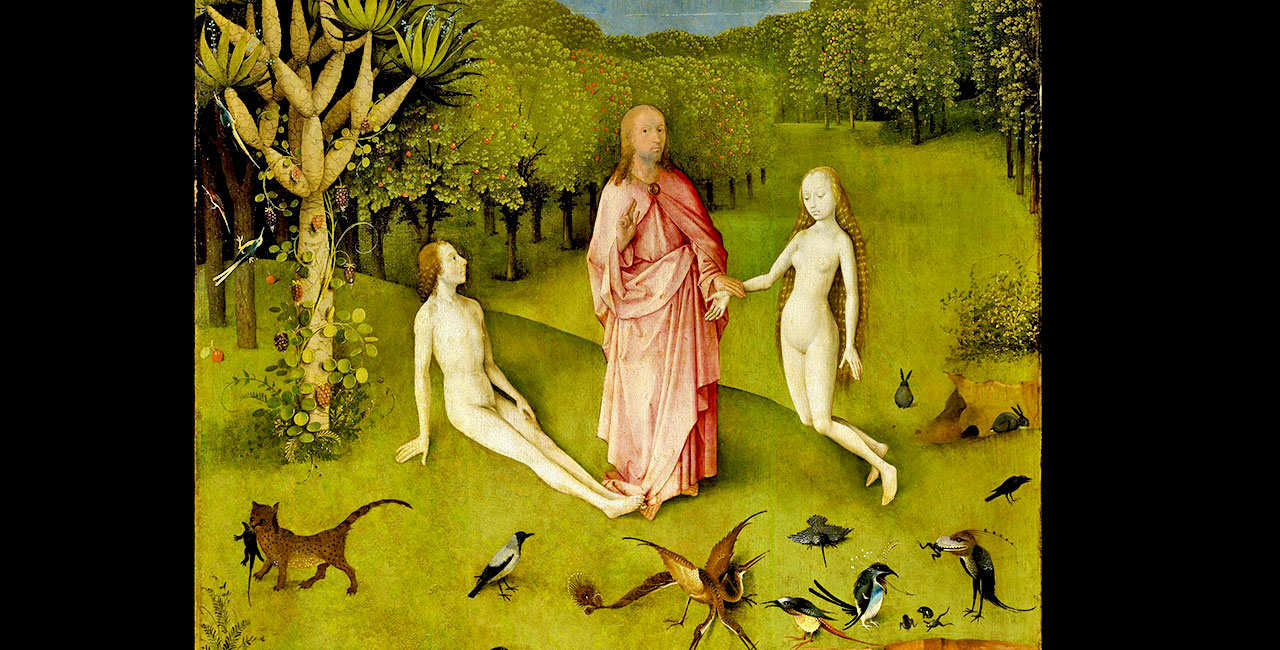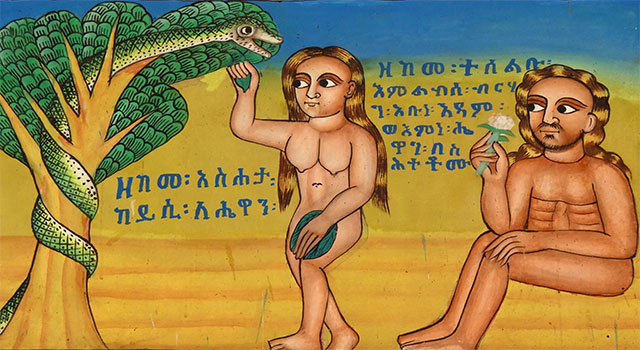What Everyone Gets Wrong about the Garden of Eden

It wasn’t made for people, and the Devil wasn’t there …
Don’t know about you, but I came out of Sunday school as a kid thinking the Bible said God made a garden for Adam and Eve, a paradise on earth for His children, and they screwed it up by obeying the Devil.
Turns out, the Bible doesn’t say any of that.
God plants the garden in the second chapter of Genesis. He has “formed man from the dust of the ground, and breathed into his nostrils the breath of life.” So now what?
YHWH, God, took the man and put him in the garden of Eden to till it and keep it.
That’s right, Adam was labor. The garden? That wasn’t made for people — it was for the gods. (Yes, gods plural, we’ll get to that.)
As a general rule, this is how Ancient Near Eastern gods did things. The Sumerian god Enki created humans to carry baskets of clay in a canal-building project so the young gods could stop working. The Babylonian god Marduk “set the gods free” by making people, “upon whom he imposed [their] service.” The Mesopotamian god Enlil wrought humanity to “take in their hands hoes and baskets, to benefit the house of the great gods.”

But in all these tales, the new help proves bothersome. They’re lazy, they steal, they stay up all night making noise. In short, they are willful creatures.
Now the first thing Yahweh did when he put Adam in the garden was to command him:
“You may freely eat of every tree of the garden; but of the tree of the knowledge of good and evil you shall not eat, for in the day that you eat of it you shall die.”
Then he thinks:
“It is not good that the man should be alone; I will make him a helper as his partner.” So [after a brief interlude in which Yahweh creates all the animals and Adam names them] YHWH, God, caused a deep sleep to fall upon the man, and he slept; then he took one of his ribs and closed up its place with flesh. And the rib that YHWH, God, had taken from the man he made into a woman and brought her to the man.
And sure enough, it’s all downhill from here. The snake tells Eve that Yahweh was lying about the tree at the middle of the garden, so she eats the fruit, she gives it to Adam and he eats it, they realize they’re naked, and they go make some clothes from fig leaves. Then ….
They heard the sound of YHWH, God, walking in the garden at the time of the evening breeze, and the man and his wife hid themselves from the presence of YHWH, God, among the trees of the garden. But YHWH, God, called to the man, and said to him, “Where are you?”
He said, “I heard the sound of you in the garden, and I was afraid, because I was naked; and I hid myself.”
He said, “Who told you that you were naked? Have you eaten from the tree of which I commanded you not to eat?”
The man said, “The woman whom you gave to be with me, she gave me fruit from the tree, and I ate.”

There’s an age-old question about this passage:
Why did God put the tree of life and the tree of the knowledge of good and evil in the middle of the garden in the first place, if he didn’t want Adam and Eve to eat the fruit?
Simple — because this is not their damn garden! It’s not some paradise designed for humans. It’s a place where divine beings saunter around enjoying the fresh air, the breathtaking views, and the fruit of sacred trees which mere mortal gardeners need to keep their grubby little hands off of!
And these, as they would say in Westeros, are the Old Gods. They’re powerful, but they’re not omnipotent or omniscient. Yahweh doesn’t know where the humans are when he can’t see them. And he didn’t know in advance that they would disobey him.
This text is older than the first chapter of Genesis, which is a later creation story from the “priestly” period, in which God — one God — speaks the world into existence and creates humans in his own image, a woman and a man simultaneously, giving them dominion over the earth. By that time in Hebrew history, the theocratic administration of the Temple had come to frown on tales of talking animals or of God and his angels going out for strolls and negotiating with shepherds. And on polytheism.
But back in the day, the Hebrews — like all Ancient Near Eastern people — believed in many gods who, much like their worshippers, had families and waged wars and played pranks and got drunk and had jobs and formed governments. We still see bits and pieces of the old theology in the earliest writings compiled in the Hebrew Bible, including Yahweh’s explanation to the Divine Council of why he’s decided the humans he brought to Eden have to be kicked out:
“See, the man has become like one of us, knowing good and evil; and now, he might reach out his hand and take also from the tree of life, and eat, and live forever.”
So Yahweh sends the two humans out the east gate of the garden and sets cherubim with flaming swords there as guards against their return. (Cherubim, by the way, weren’t naked little boys with dove’s wings; they were some sort of human/large-animal hybrid with four wings, and were not to be trifled with.)
The gods, for their part, stayed put. In their garden.
Now about that serpent …
It was a snake. Not the devil, just a snake.

How do we know? Well, first off, that’s what the text says:
Now the serpent was more crafty than any other wild animal that YHWH, God, had made.
It was a wild animal. Presumably, one that had legs or wings like other animals, and could talk like gods and people, until Yahweh cursed it for telling Eve the truth about the tree:
“Because you have done this,
cursed are you among all animals
and among all wild creatures;
upon your belly you shall go,
and dust you shall eat
all the days of your life.
I will put enmity between you and the woman,
and between your offspring and hers;
he will strike your head,
and you will strike his heel.”
We should note that Satan doesn’t go around biting at people’s heels and dodging blows from folks trying to bash his head in. Snakes do that.
Also, at this point in Hebrew theology, the being we think of as the Devil did not yet exist. There was a member of the Divine Council called the satan (the accuser), who appears in the framing device for the story of Job for example, but he’s not mentioned in Genesis.
During the Second Temple era, after the Babylonian exile, traditions of malevolent spirits and fallen angels would arise within Judaism, but that would come many centuries after the story of Genesis 2–3 was first told. If you’re into that kind of thing, check out the Enoch literature, some of which was popular with the original Christians.
Ms. Henderson, I still love you
So, God didn’t create a perfect garden for people to live in, and the Devil wasn’t there. I was conned.
I imagine my old Sunday school teacher has by now gone to her reward. And you know, I’d consider perhaps I just wasn’t paying as much attention as I should have and maybe I’m misremembering my instruction, if not for the fact that everybody else misremembers the story pretty much the same way.
The book simply does not say what we believe it should say, so we’ve silently agreed that it does, after all, even though it clearly doesn’t.
And so, Ms. Henderson, that’s what you taught me. And being of Sunday-school age, I went ahead and believed it’s what the book meant, even if it’s not what was written down.
You did it for my soul, and I thank you.
But I have to say, I kinda like the Old Gods. I favor a god who creates humanity on a whim and sorta botches it, then has to do something about it and ends up making a mess out of that situation as well.
Because, you know, that would explain a lot.
Not a member of Medium? Read every story from Paul Thomas Zenki (and thousands of other writers on Medium) by subscribing today. Your membership directly supports Paul Thomas Zenki and other writers you read. Click here to join.
Header image: Detail from “The Garden of Earthly Delights,” Hieronymus Bosch, c. 1485 (public domain)
Paul Thomas Zenki is an essayist, ghostwriter, copywriter, marketer, songwriter, and consultant living in Athens, GA.